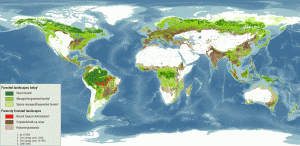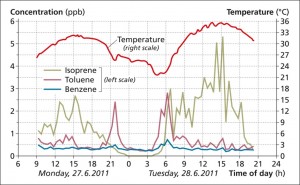
Agricultural demands have always driven civilization. In recent years, many nations have turned to deforestation as a method to clear more land for agriculture. However, deforestation for creating cropland has always been a contentious issue in climate change, as trees are essential for pulling carbon dioxide (CO2) from the atmosphere and sequestering it in vegetation. Furthermore, cutting down forests also rereleases much of the carbon that trees have locked away.
Although deforestation has many climate warming effects, it can also increase albedo, a measurement of how reflective the earth’s surface is. A cooling effect takes place as the dark canopy leaves are replaced by lighter farmland, which reflects more light. Now, a study conducted by Yale Assistant Professor of Atmospheric Chemistry Nadine Unger has shown that deforestation may cool the global climate even further by reducing the amount of biogenic volatile organic compounds (BVOCs) released.
Normally, plants release a large variety of BVOCs, compounds that help regulate their temperature. These compounds appear to help cool down the immediate surroundings of plants. Butin low humidity, BVOCs strongly absorb heat emanating from the surface of the earth. As a result, they elevate minimum temperatures to well above the dew point at night instead of allowing the heat to radiate back into space. BVOCs also rapidly oxidize in the atmosphere and generate ozone gas that can extend the lifetime of methane, an extremely powerful greenhouse gas.

Unger’s research demonstrated how the reduction of released BVOCs has resulted in a net cooling effect on the temperature of the earth that is comparable to the warming and cooling effects of CO2 release and increased surface albedo. These results suggest that accounting for BVOCs and their atmospheric chemistry is essential for environmental research and climate protection strategies. Future reforestation efforts will need to take into consideration the effect BVOCs have on global climate.
